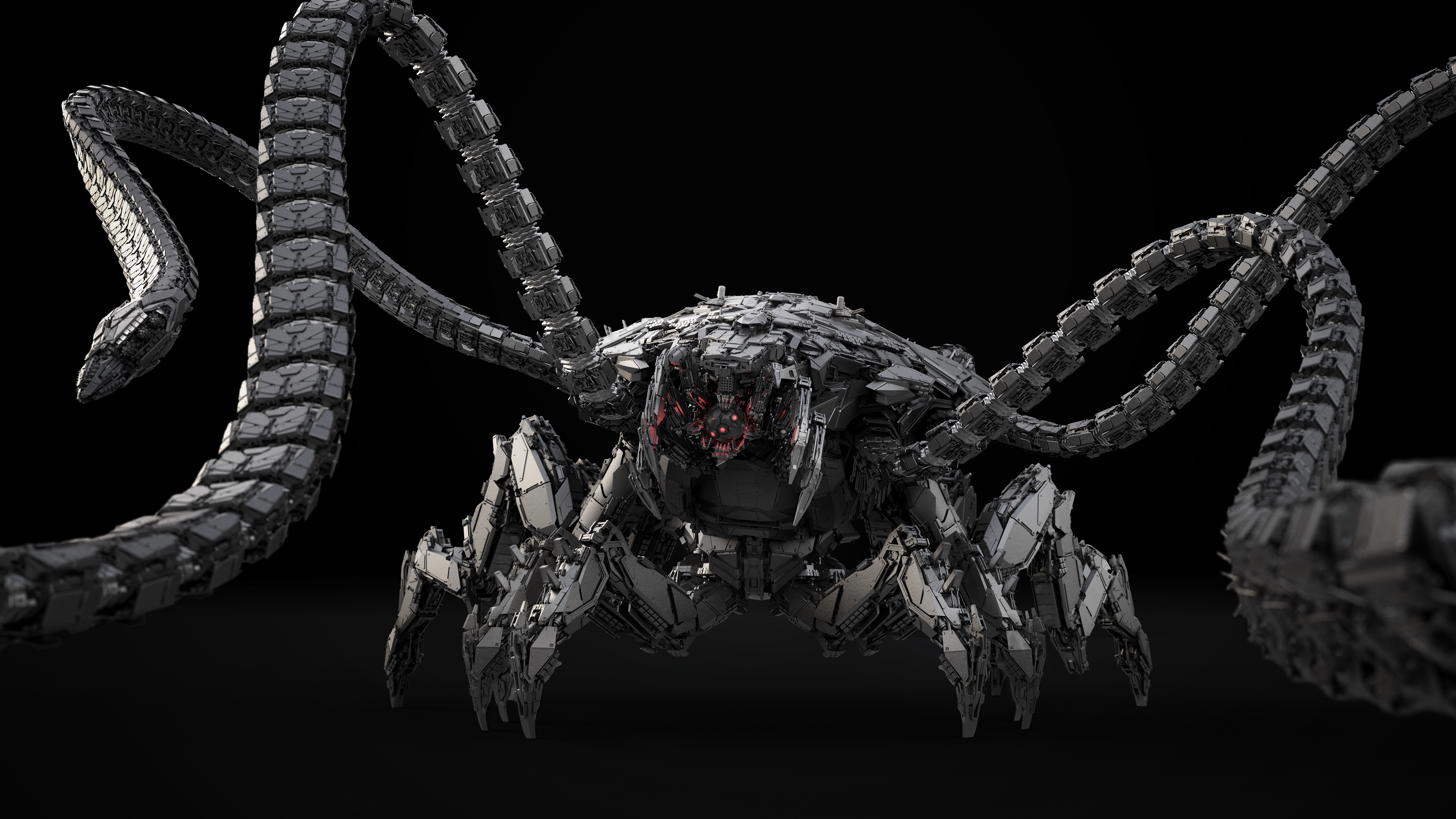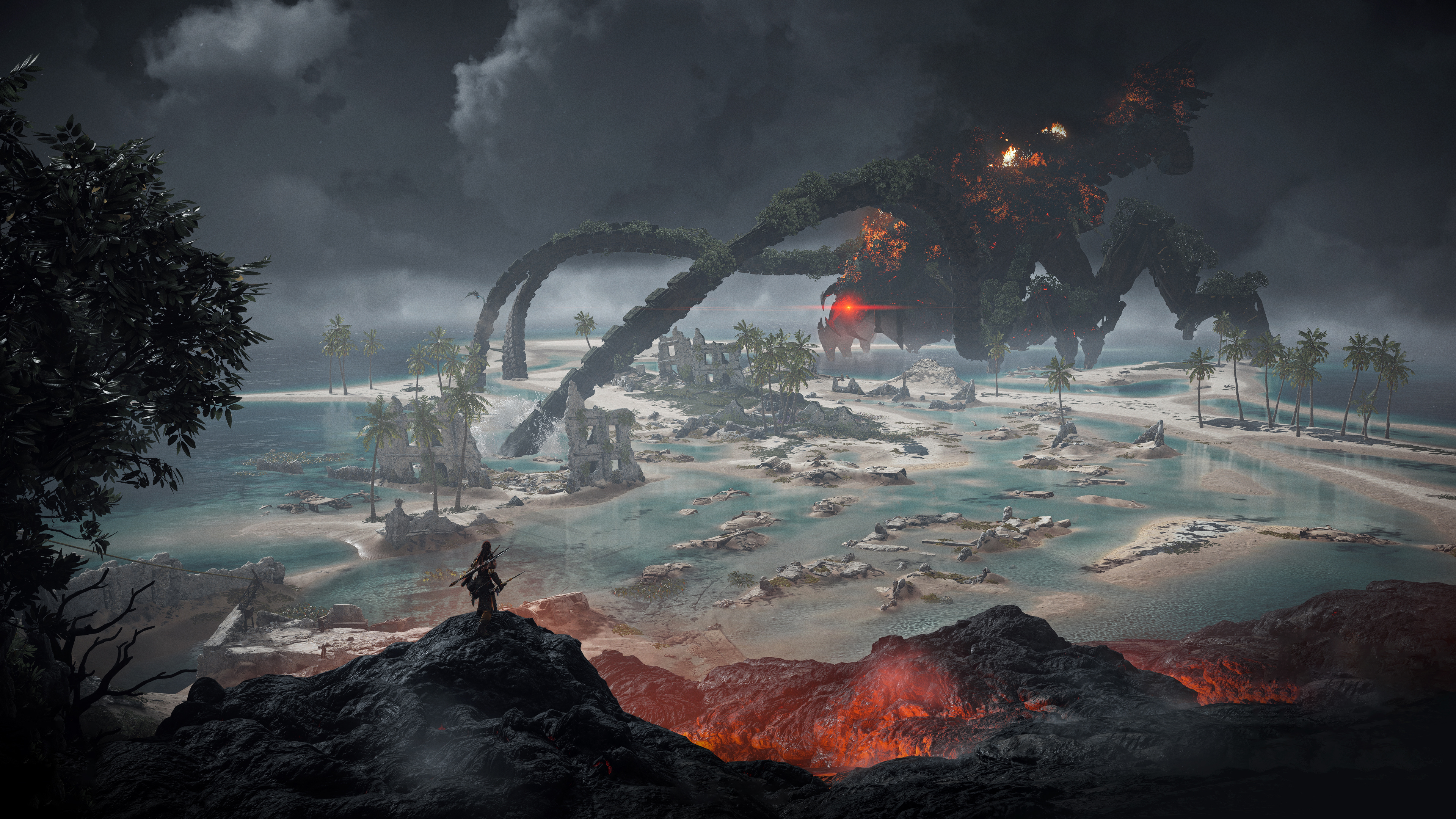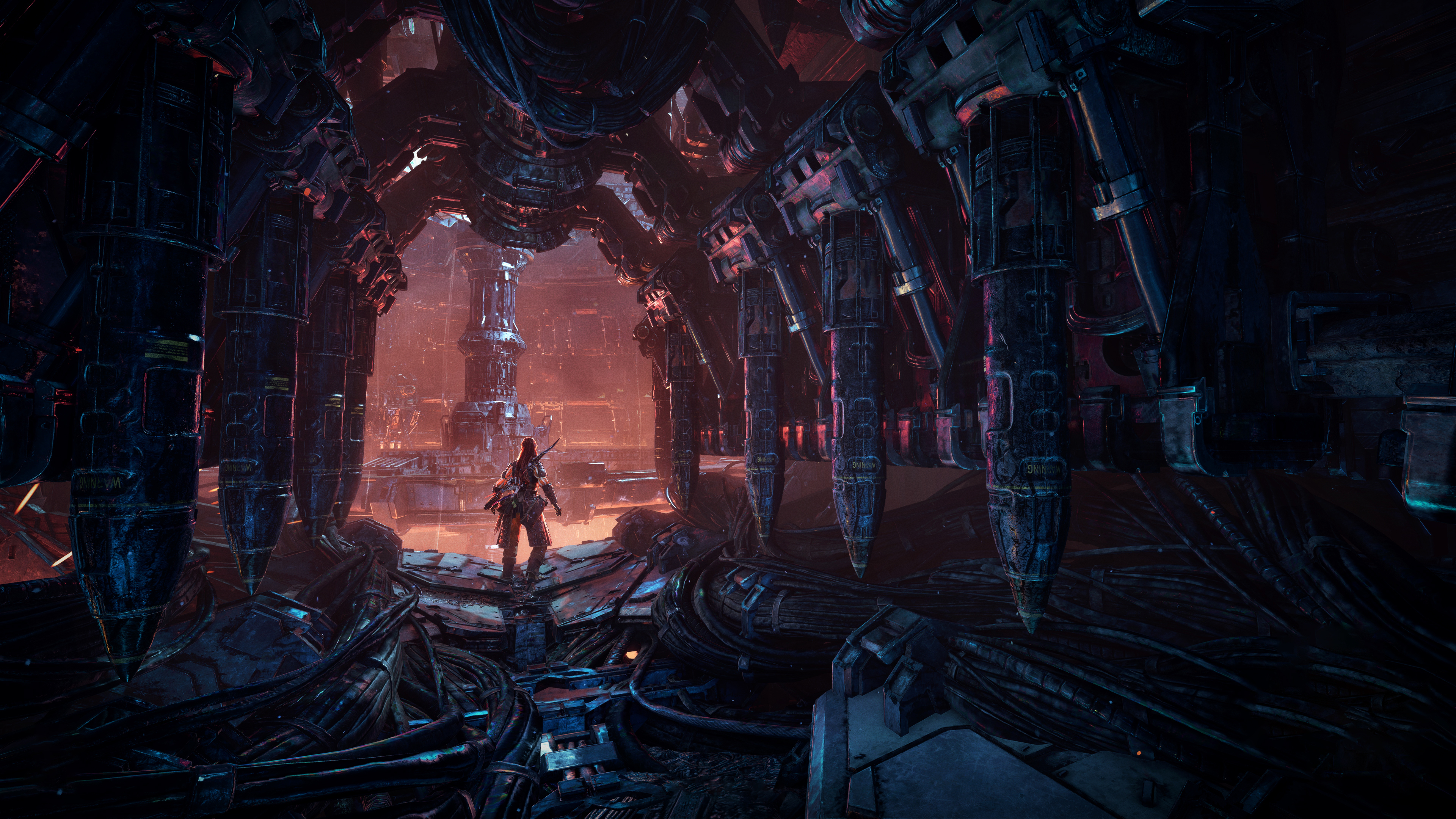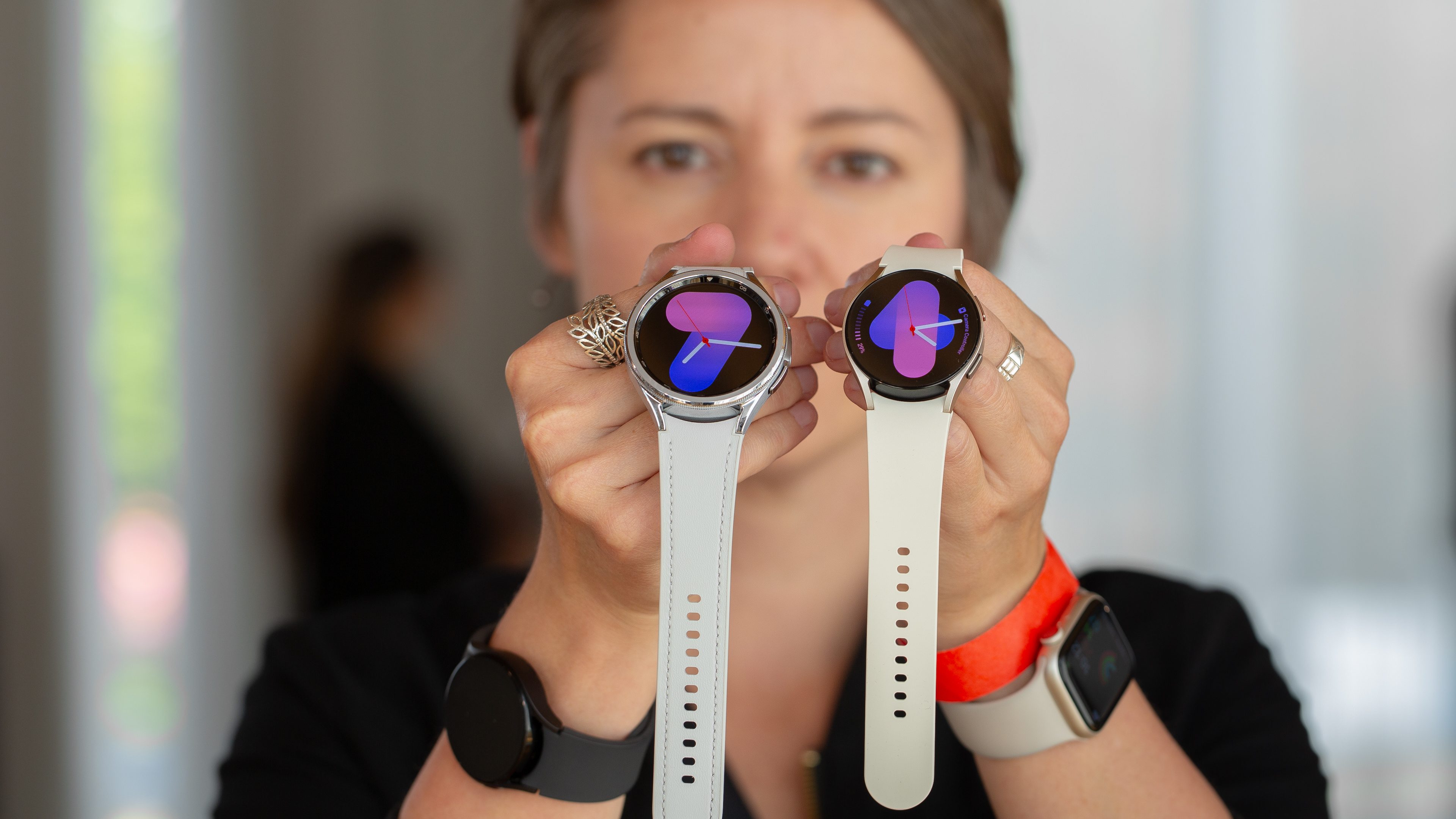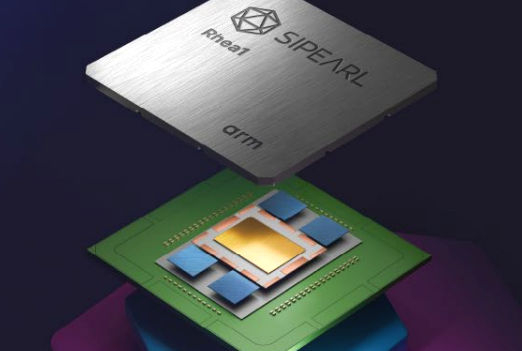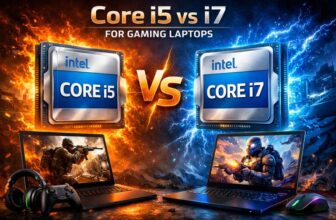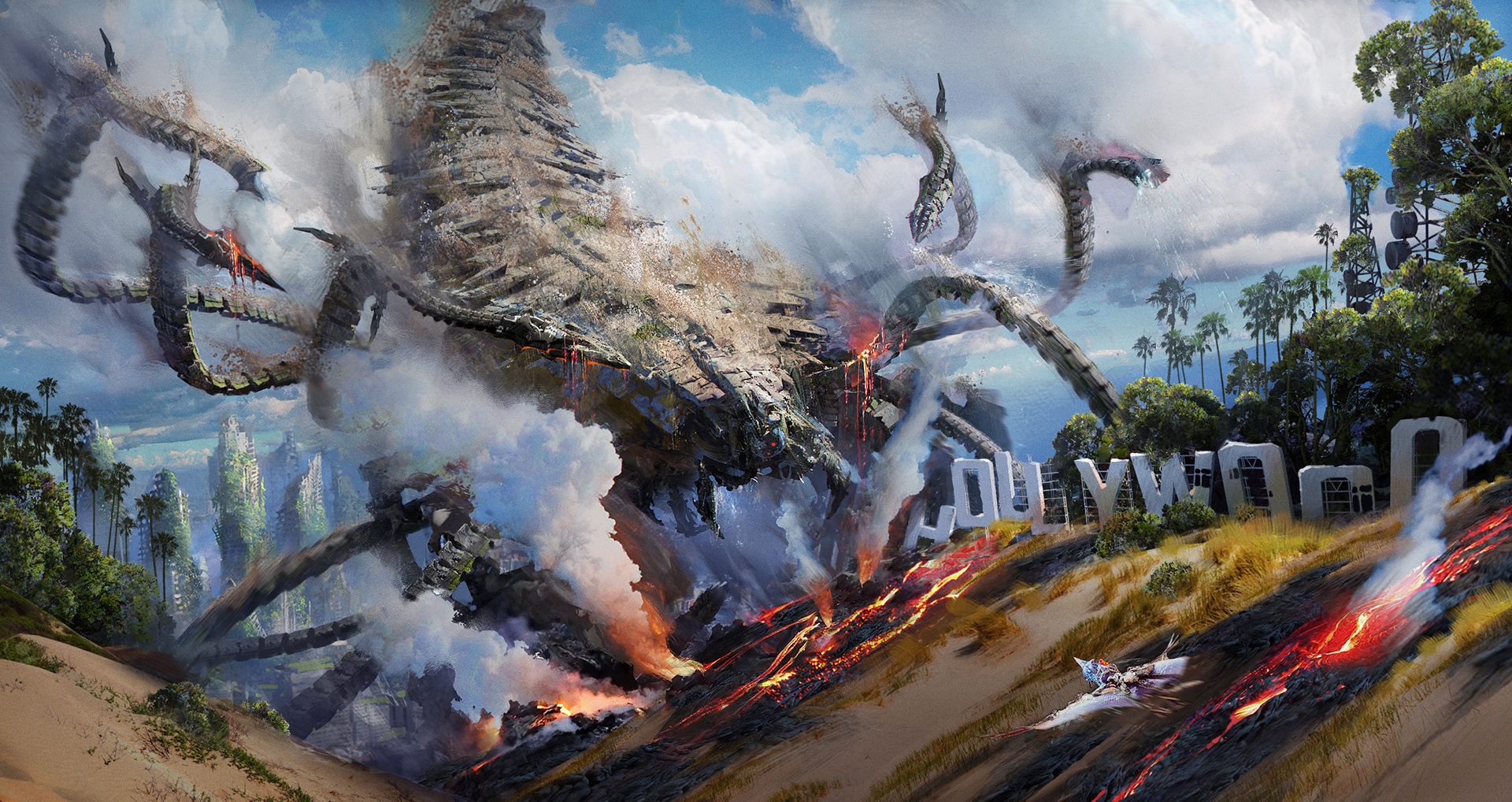
Hi everyone! It’s been just over a year since we released Burning Shores, the expansion to Horizon Forbidden West on PS5, and with it, we challenged you with one of our most elaborate boss battles to date! We talked to our developers at Guerrilla to find out about the ideation and creation process of this epic fight.
SPOILER WARNING: Please note that this behind-the-scenes feature contains major spoilers for the storyline and gameplay elements of Horizon Forbidden West: Burning Shores. To get the most out of this in-depth article, we strongly recommend completing the quest ‘His Final Act’ prior to reading.

A threat from the Old World
The Horus can be seen throughout our journey with Aloy, both in Horizon Zero Dawn as well as Horizon Forbidden West, albeit at first in a dormant state – and the continuation of Aloy’s story in Burning Shores felt like the perfect moment to bring it to life, says Misja Baas, Senior Art Director at Guerrilla.
In the ideation stage, it was clear that the design of the Horus needed to serve two purposes: First of all, to tell the story of the end of the world in the universe of the Horizon franchise.
“For something that monumental, you need something that fits, something epic to go with that theme,” says Baas. “Imagine these giant machines crawling through the landscape, drilling holes in bunkers and wiping entire cities off the face of the earth. They also served as mobile factories producing Corruptors and Deathbringers to do the groundwork. Together they would form the swarms that ended up destroying the world as we know it. Secondly, we also wanted something that would look impressive and amazing in the landscape. For the final design, we settled on these colossal, almost insectoid machines. It allowed us to really drape the machine on the landscape and make it look very dynamic, as if you’re seeing the last moments of life on earth.”
Leaving the Forbidden West, Los Angeles was the next obvious destination with the Hollywood sign as the perfect stage for an epic machine confrontation with this titan.
Force of nature
When Arne Oehme, Principal Game Designer was tasked to design the penultimate battle that Aloy and Seyka are challenged with in their efforts to put an end to Londra’s devious plans, he knew he had an important task at hand.
“We had to complete the story arc of Horizon Forbidden West, as it was the final quest of the expansion and as such, we had to deliver a level that was worthy of being its grand finale,” says Oehme. “As we are fighting a machine that was responsible for the destruction of civilization, it felt like it shouldn’t be easy to take down with just your bow and arrows. We wanted to challenge all of Aloy’s abilities in this conclusive fight: her ability to sneak in unseen and stay hidden, her agility and ability to climb and swim, and also to collaborate with her friends.”
Oehme points out that the quest is built up in several sections. “The goal of the first section of the level was mostly to establish the Horus as an overwhelming force of nature, but we also wanted to pace ourselves and give us the potential to escalate the intensity throughout the fight,” he says. “Starting with a stealth section felt right to set the tone: The Horus is high up on the hill, it sits in an imposing position looming over you as you approach the area and this section gave us the potential to deliver the narrative and allow the characters to formulate a plan of attack.”
During this section you sneak past the Horus’ giant tentacles, which are being used as search lights, while you are surrounded by Corrupters that Londra created using the active Horus. As you sneak past these machines (or choose to take them out head on) you make your way up to sabotage the pump used to cool down the Horus together with your companion, Seyka.
“This section was also a perfect moment for us to help build Aloy and Seyka’s relationship,” Oehme points out, “Before things get hectic!”
Up close and far away
Getting closer, you transition from the hilly mountains to the beach with a cinematic that seamlessly flows over into gameplay.
“In order to create structure in the fight and to give it good pacing and rhythm, we tried to separate the player and the Horus throughout the encounter,” says Baas. “If we were only going to fight the Horus up close, it felt like we were ‘clipping its toenails’ so to speak. You would constantly be really close and you wouldn’t see a lot of it and we wanted to make sure that players get a chance to see the machine and observe its abilities. We also wanted players to witness its ability to move around and notice the destruction it causes to the landscape in its path. It was really important to us to give the Horus this moment of presentation to give players a demonstration of its power.
“To make this part of the fight feel more spectacular and dramatic we had to do completely the opposite of what we always do,” Baas recalls, referring to the lush and vibrant nature that the Horizon franchise is known for. “Our environments and settings are usually places you really want to go to and spend time in. But here, because we’re dealing with this final moment and we are showing what could be described as a flashback of the end of the world, we decided to do a 180 and go for gray and dark. A very different mood compared to what we usually aim for in Horizon.
“During the anniversary of Burning Shores last month, many players in the Horizon community pointed out that this moment was one of their highlights when playing the expansion. Senior Creature Animator David Vince was responsible for establishing the look and feel of the movement of the Horus making its way to the beach.
“When we had to figure out the movement theme for the Horus, we wanted it to feel like we were bringing it back from the dead,” says Vince. “This machine has been there for a thousand years, and now it’s being reanimated and controlled by something that’s not itself, so it’s basically a zombie! That became our theme for the Horus and you see this in this transition as it crawls its way down the beach: It’s not powering through, it’s struggling to get there as it’s clawing with its tentacles and pulling itself along. It really is lurching and lumbering forward in an uncoordinated manner, like a shambling zombie would. So that was our goal, to make sure it looked like it wasn’t a fully sentient titan, but one that had been hijacked and doing somebody else’s bidding.”
You follow the Horus down to the beach, traversing the cliffs and ruins of Los Angeles along the way. Oehme further explains how this was a very deliberate choice when designing the quest: “The idea behind moving to different locations in that fight comes from the fact that a quest almost always wants to be a journey.”
As both Oehme and Baas mentioned earlier, it was important to show the player how much impact this machine had on its environment.
“It didn’t feel good if we were tied to only one location in the world, we felt like it needed to move around to actually show you this destruction,” says Oehme. “The beach also gave us a reasonably flat space for the continuation of the combat encounter, with enough room for the Horus to stomp and splash around in the water.”
Baas points out that working on an expansion to the main game meant that we could focus all our efforts on a single encounter and make it as awesome and epic as possible. For this all to come together, Oehme worked with multiple disciplines across development.
“This was very different content from what we were used to building, so it required a new approach,” says Oehme. “We worked together with an awesome team of specialist developers from Game Tech, Art, VFX, Animation and Sound Design to tackle the unique challenges that surfaced during development of this quest.”
One of these challenges was climbing the moving legs of the Horus to expose and destroy its heat sinks. “We wanted Seyka to distract the main armaments of the Horus to give Aloy windows of opportunity to dart in and strike, says Oehme. “As a player, being below the Horus already gives you the desire to climb it, so we wanted to make sure you could actually do that. But of course, something of that scale, and moving around and shooting you, that’s something that’s quite different from anything we had done before – but we felt like we had to do it.”
Senior Technical Designer Marcin Matuszczyk remembers tackling this specific challenge. “We already had support for climbing objects and machines like the Tallneck, but we had to improve quite a lot to make it look better for the scale and size of the Horus,” he says. “We had to create some new tech to make sure that Aloy’s hands and feet look nice against the machines’ climbing points that were placed on the leg. The Horus turned out to be the most complex machine we ever made in terms of design, scale, and collaboration between teams.”
Vince expands on animating the behemoth boss. “For animation, some of the complexities that came with the Horus weren’t necessarily the model itself, but more the joint-count that was in it,” he says. “All of our machines have orientation or articulation joints that enable us to animate them. For comparison, the Slitherfang used to be our highest joint-count machine capped at around 240 joints. The Horus has over a thousand more joints than that! The Horus has its legs and tentacles, and having it turn around takes a very long time to do. It takes about 50 seconds to do a full rotation with around 1400 frames of animation, which is one animation of the 200 animations that it has.”
“The Horus is massive! It takes up so much of your screen,” adds Vince. “Throughout the beach encounter, Seyka is up there flying around dodging tentacles and missile fire. The player isn’t always looking because it’s contending with the Horus itself. Quite a lot of Seyka’s actions that are tied to what the Horus is doing often go unnoticed. One of the biggest animations we had is when Seyka causes the Horus to trip. She flies under the titan, causing the tentacles to crash into its legs and it becomes entangled – which is incredibly hard to animate. Most players might have missed it as they are busy dodging attacks, but Seyka will help Aloy in every section of the fight, even if you don’t see it.”
Oehme points out that some of the fights most memorable moments are too good to risk spoiling here, and invites players to dive in.
“There’s actually another part to this fight that we haven’t even touched on yet,” he says. “But for those who haven’t played yet, it might be better to experience it for yourself!”
Horizon Forbidden West Complete Edition is available on PS5 and PC.
Hi everyone! It’s been just over a year since we released Burning Shores, the expansion to Horizon Forbidden West on PS5, and with it, we challenged you with one of our most elaborate boss battles to date! We talked to our developers at Guerrilla to find out about the ideation and creation process of this epic fight.
SPOILER WARNING: Please note that this behind-the-scenes feature contains major spoilers for the storyline and gameplay elements of Horizon Forbidden West: Burning Shores. To get the most out of this in-depth article, we strongly recommend completing the quest ‘His Final Act’ prior to reading.

A threat from the Old World
The Horus can be seen throughout our journey with Aloy, both in Horizon Zero Dawn as well as Horizon Forbidden West, albeit at first in a dormant state – and the continuation of Aloy’s story in Burning Shores felt like the perfect moment to bring it to life, says Misja Baas, Senior Art Director at Guerrilla.
In the ideation stage, it was clear that the design of the Horus needed to serve two purposes: First of all, to tell the story of the end of the world in the universe of the Horizon franchise.
“For something that monumental, you need something that fits, something epic to go with that theme,” says Baas. “Imagine these giant machines crawling through the landscape, drilling holes in bunkers and wiping entire cities off the face of the earth. They also served as mobile factories producing Corruptors and Deathbringers to do the groundwork. Together they would form the swarms that ended up destroying the world as we know it. Secondly, we also wanted something that would look impressive and amazing in the landscape. For the final design, we settled on these colossal, almost insectoid machines. It allowed us to really drape the machine on the landscape and make it look very dynamic, as if you’re seeing the last moments of life on earth.”
Leaving the Forbidden West, Los Angeles was the next obvious destination with the Hollywood sign as the perfect stage for an epic machine confrontation with this titan.
Force of nature
When Arne Oehme, Principal Game Designer was tasked to design the penultimate battle that Aloy and Seyka are challenged with in their efforts to put an end to Londra’s devious plans, he knew he had an important task at hand.
“We had to complete the story arc of Horizon Forbidden West, as it was the final quest of the expansion and as such, we had to deliver a level that was worthy of being its grand finale,” says Oehme. “As we are fighting a machine that was responsible for the destruction of civilization, it felt like it shouldn’t be easy to take down with just your bow and arrows. We wanted to challenge all of Aloy’s abilities in this conclusive fight: her ability to sneak in unseen and stay hidden, her agility and ability to climb and swim, and also to collaborate with her friends.”
Oehme points out that the quest is built up in several sections. “The goal of the first section of the level was mostly to establish the Horus as an overwhelming force of nature, but we also wanted to pace ourselves and give us the potential to escalate the intensity throughout the fight,” he says. “Starting with a stealth section felt right to set the tone: The Horus is high up on the hill, it sits in an imposing position looming over you as you approach the area and this section gave us the potential to deliver the narrative and allow the characters to formulate a plan of attack.”
During this section you sneak past the Horus’ giant tentacles, which are being used as search lights, while you are surrounded by Corrupters that Londra created using the active Horus. As you sneak past these machines (or choose to take them out head on) you make your way up to sabotage the pump used to cool down the Horus together with your companion, Seyka.
“This section was also a perfect moment for us to help build Aloy and Seyka’s relationship,” Oehme points out, “Before things get hectic!”
Up close and far away
Getting closer, you transition from the hilly mountains to the beach with a cinematic that seamlessly flows over into gameplay.
“In order to create structure in the fight and to give it good pacing and rhythm, we tried to separate the player and the Horus throughout the encounter,” says Baas. “If we were only going to fight the Horus up close, it felt like we were ‘clipping its toenails’ so to speak. You would constantly be really close and you wouldn’t see a lot of it and we wanted to make sure that players get a chance to see the machine and observe its abilities. We also wanted players to witness its ability to move around and notice the destruction it causes to the landscape in its path. It was really important to us to give the Horus this moment of presentation to give players a demonstration of its power.
“To make this part of the fight feel more spectacular and dramatic we had to do completely the opposite of what we always do,” Baas recalls, referring to the lush and vibrant nature that the Horizon franchise is known for. “Our environments and settings are usually places you really want to go to and spend time in. But here, because we’re dealing with this final moment and we are showing what could be described as a flashback of the end of the world, we decided to do a 180 and go for gray and dark. A very different mood compared to what we usually aim for in Horizon.
“During the anniversary of Burning Shores last month, many players in the Horizon community pointed out that this moment was one of their highlights when playing the expansion. Senior Creature Animator David Vince was responsible for establishing the look and feel of the movement of the Horus making its way to the beach.
“When we had to figure out the movement theme for the Horus, we wanted it to feel like we were bringing it back from the dead,” says Vince. “This machine has been there for a thousand years, and now it’s being reanimated and controlled by something that’s not itself, so it’s basically a zombie! That became our theme for the Horus and you see this in this transition as it crawls its way down the beach: It’s not powering through, it’s struggling to get there as it’s clawing with its tentacles and pulling itself along. It really is lurching and lumbering forward in an uncoordinated manner, like a shambling zombie would. So that was our goal, to make sure it looked like it wasn’t a fully sentient titan, but one that had been hijacked and doing somebody else’s bidding.”
You follow the Horus down to the beach, traversing the cliffs and ruins of Los Angeles along the way. Oehme further explains how this was a very deliberate choice when designing the quest: “The idea behind moving to different locations in that fight comes from the fact that a quest almost always wants to be a journey.”
As both Oehme and Baas mentioned earlier, it was important to show the player how much impact this machine had on its environment.
“It didn’t feel good if we were tied to only one location in the world, we felt like it needed to move around to actually show you this destruction,” says Oehme. “The beach also gave us a reasonably flat space for the continuation of the combat encounter, with enough room for the Horus to stomp and splash around in the water.”
Baas points out that working on an expansion to the main game meant that we could focus all our efforts on a single encounter and make it as awesome and epic as possible. For this all to come together, Oehme worked with multiple disciplines across development.
“This was very different content from what we were used to building, so it required a new approach,” says Oehme. “We worked together with an awesome team of specialist developers from Game Tech, Art, VFX, Animation and Sound Design to tackle the unique challenges that surfaced during development of this quest.”
One of these challenges was climbing the moving legs of the Horus to expose and destroy its heat sinks. “We wanted Seyka to distract the main armaments of the Horus to give Aloy windows of opportunity to dart in and strike, says Oehme. “As a player, being below the Horus already gives you the desire to climb it, so we wanted to make sure you could actually do that. But of course, something of that scale, and moving around and shooting you, that’s something that’s quite different from anything we had done before – but we felt like we had to do it.”
Senior Technical Designer Marcin Matuszczyk remembers tackling this specific challenge. “We already had support for climbing objects and machines like the Tallneck, but we had to improve quite a lot to make it look better for the scale and size of the Horus,” he says. “We had to create some new tech to make sure that Aloy’s hands and feet look nice against the machines’ climbing points that were placed on the leg. The Horus turned out to be the most complex machine we ever made in terms of design, scale, and collaboration between teams.”
Vince expands on animating the behemoth boss. “For animation, some of the complexities that came with the Horus weren’t necessarily the model itself, but more the joint-count that was in it,” he says. “All of our machines have orientation or articulation joints that enable us to animate them. For comparison, the Slitherfang used to be our highest joint-count machine capped at around 240 joints. The Horus has over a thousand more joints than that! The Horus has its legs and tentacles, and having it turn around takes a very long time to do. It takes about 50 seconds to do a full rotation with around 1400 frames of animation, which is one animation of the 200 animations that it has.”
“The Horus is massive! It takes up so much of your screen,” adds Vince. “Throughout the beach encounter, Seyka is up there flying around dodging tentacles and missile fire. The player isn’t always looking because it’s contending with the Horus itself. Quite a lot of Seyka’s actions that are tied to what the Horus is doing often go unnoticed. One of the biggest animations we had is when Seyka causes the Horus to trip. She flies under the titan, causing the tentacles to crash into its legs and it becomes entangled – which is incredibly hard to animate. Most players might have missed it as they are busy dodging attacks, but Seyka will help Aloy in every section of the fight, even if you don’t see it.”
Oehme points out that some of the fights most memorable moments are too good to risk spoiling here, and invites players to dive in.
“There’s actually another part to this fight that we haven’t even touched on yet,” he says. “But for those who haven’t played yet, it might be better to experience it for yourself!”
Horizon Forbidden West Complete Edition is available on PS5 and PC.

